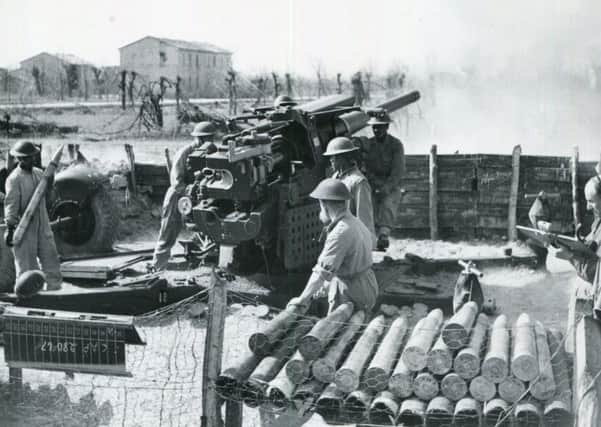The Derry Boys


Although the Regiment had marched off in November 1939 as a body, there was no formal homecoming. Instead, men came home as individuals as their ‘demob’ categories took effect.
One such individual was the Regiment’s best-known officer, Major Sir Basil McFarland. In June 1945 he was re-elected to the mayoralty of his native city and later appointed Honorary Colonel of 9th (Londonderry) Regiment. Sir Basil and all who served in the Regiment – his Derry Boys – could look back with pride on its achievements during the war.
Advertisement
Hide AdAdvertisement
Hide AdNot for nothing had 9th Londonderry achieved its reputation as the finest heavy anti-aircraft regiment in the Mediterranean. It had also been the first reserve forces unit deployed overseas, when it moved to Alexandria in Egypt in November 1939.
Yet when it reached Alexandria the Regiment was only partially trained with no sign that it would become the formidable unit that the Royal Navy was to demand for the defences of Tripoli when that city fell to Eighth Army in 1943.
In November 1939 many in 24, 25 and 26 Batteries had yet to see a 3.7-inch AA gun, the weapon that became their standard equipment. With the few 3.7s in Alexandria, manned by 20 Battery and the Royal Marine Artillery, the Derry Boys began intensive training. Long hours of sweating in the sun paid off when they engaged the first Italian raid on Alexandria in June 1940.
The night raid was fought off with no damage to ships in the harbour. No aircraft were shot down but that changed the following day when a reconnaissance aircraft appeared to photograph the results of the raid. As the recce plane made its getaway over Agami Point, it was engaged by guns of 25 Battery. The aircraft was hit, fell from the sky and crashed. The Derry Boys had their first ‘victory’.
Advertisement
Hide AdAdvertisement
Hide AdMore was to follow as Alexandria, eastern home of the Mediterranean Fleet, came under increasing attention from the Regia Aeronautica and, later, the Luftwaffe. In spite of that, for the eighteen months that the Derry Boys defended the harbour no enemy bombs fell on ships there.


In the summer of 1940, 25 Battery was detached to defend Port Sudan, remaining in Sudan until April 1941. Italian bombers raided Port Sudan but again not one bomb hit a ship in the harbour. The high standard of the defence of Alexandria and Port Sudan was clear to the Royal Navy and would be remembered in late 1942.
There had been a price to pay for the defence of Alexandria. Already the Derry Boys had lost men killed when some enemy bombs had fallen on them. When 25 Battery returned from Sudan on Easter Day 1941 it was immediately ordered to the Western Desert –Rommel had broken through the Halfaya Pass on Good Friday and the battery was deployed to Mersa Matruh. Then regarded as Egypt’s last line of defence, Matruh was where 25 Battery suffered its first fatalities.
Having defended the Canal Zone in spring and early summer 1942, the Regiment was posted to join Ninth Army in Palestine to defend against a possible German breakthrough in the Caucasus and advance towards Egypt.
Advertisement
Hide AdAdvertisement
Hide AdWhile in Palestine the gunners learned of Eighth Army’s victory at El Alamein and of the repercussions for them. With Eighth Army poised to advance into Libya, the port city of Tripoli became an important target. Its harbour would allow easier re-supply of Eighth Army for its advance into Tunisia.


Aware that Tripoli would become a prime Luftwaffe target, the Royal Navy demanded that 9th (Londonderry) HAA Regiment be at the core of the port’s defences. And so the Regiment was ordered to leave Palestine, catch up with the advancing Eighth Army and take over positions in Tripoli as soon as the city fell.
Tripoli was captured by Eighth Army on 23 January 1943. Within hours 9th Regiment was manning gun positions around the harbour and had even increased its strength by taking over some Italian 90mm AA guns.
The defence of Tripoli was the apotheosis of the Regiment. Within days the Luftwaffe were pounding the harbour but raid after raid was beaten off, often with heavy losses to the attackers. During February and March there were almost fifty bombing raids with one occurring on 20 February while General Montgomery was visiting 9th Regiment. On 19 March German aircraft attacked at low level to avoid detection by radar. Heavy rain and low cloud also reduced visibility and muffled sound.
Advertisement
Hide Ad